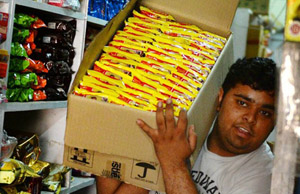New Delhi, Jun 3: Acting tough, Delhi government today banned the sale of popular instant noodles Maggi for 15 days and asked the Indian arm of Swiss manufacturer Nestle to withdraw the existing stock.
Announcing the decision, Delhi Health Minister Satyender Jain said that a fresh stock of Maggi noodles will be tested following which a decision will be taken.He also said government will carry out lab testing of all other noodles brands available in the city and will take action based on the reports.
"Government has put a ban on Maggi noodles for 15 days. We have asked Nestle India to withdraw Maggi stocks within 15 days. We will carry out lab testing of fresh stocks and a decision will be taken accordingly thereafter," Jain said.
The decision came nearly two hours after several top Nestle India officials explained to him their position on the issue.
Jain said government will file a case against Nestle India in court as per provisions of the Food Adulteration Act and will "not compromise" on issues relating to health safety.
Yesterday, the Delhi government had said that it found samples of Maggi noodles "unsafe" for consumption as it contained lead beyond the permissible level in Maggi masala (tastemaker).
According to officials, a total of 13 samples of masala (tastemaker) were lifted by authorities from various areas of the city last week of which 10 were found unsafe.Five samples of masala were also having monosodium glutamate without proper label declaration which is an offence under the category of misbranding, they said.A number of states including Kerala and Haryana have initiated steps on the Maggi issue.
The probe into alleged lapses of food safety standards has already been expanded to test Maggi noodle samples from across the country following detection of monosodium glutamate and lead in excess of the prescribed limit in the noodles.However, Nestle India claimed it has got samples tested in an external laboratory as well as in-house and that the product was found "safe to eat".





Comments
Add new comment